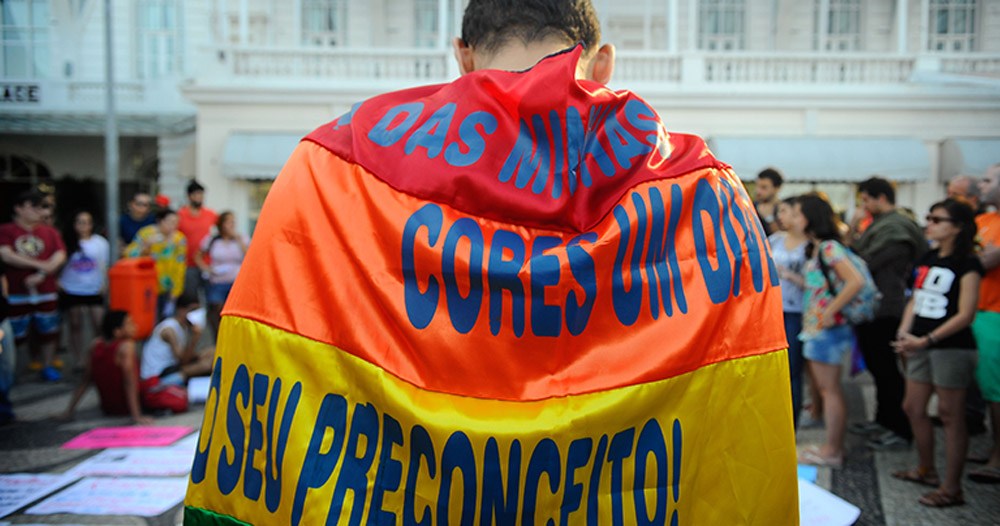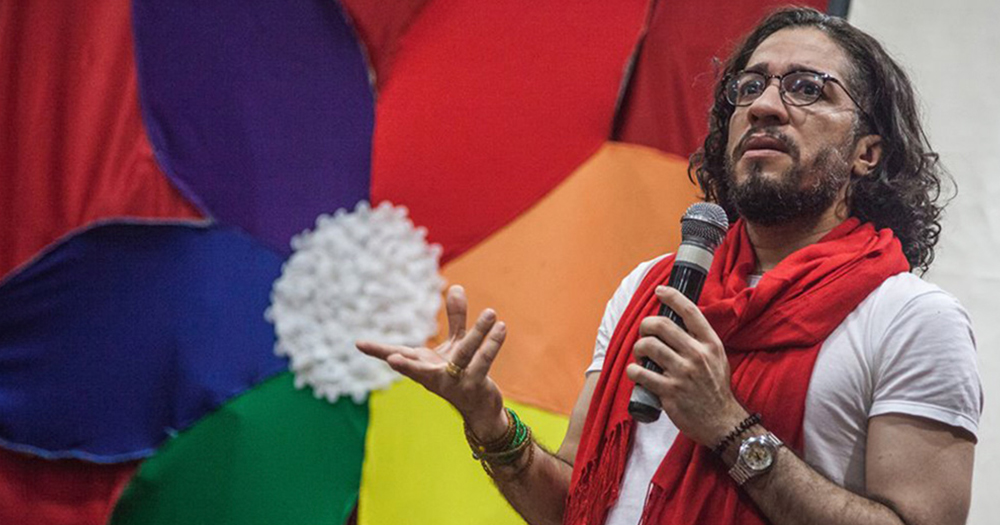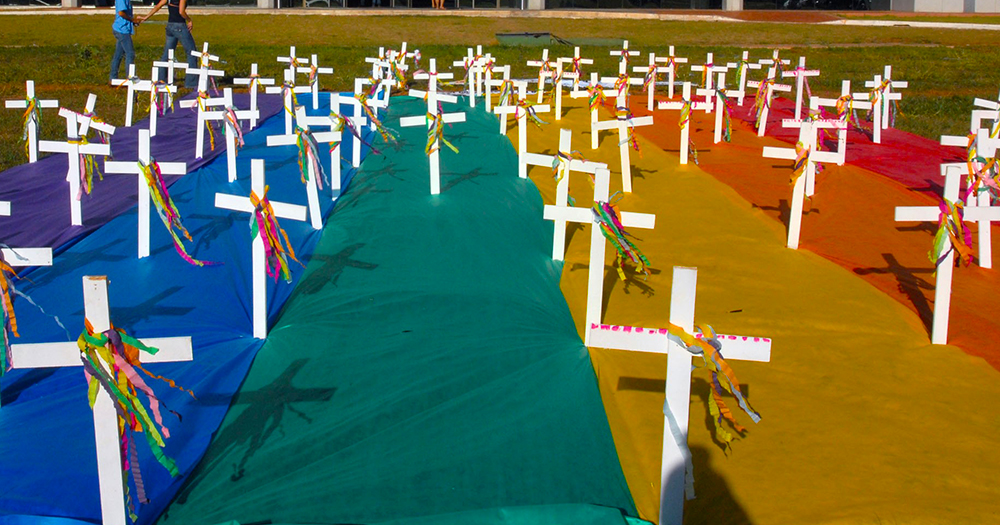Brazil is a country of contradictions. For many in the LGBT+ community worldwide it has become synonymous with one of the world’s largest Pride parades. In 2017, the organisers of the Sao Paolo parade predicted that over three million attendees would throng the streets in colourful celebration.
But there is another side. The annual March For Jesus also takes place in the same city and attracts up to two million attendees – a sign of how deeply religious the population are. This includes the increasingly popular Christian evangelical movement, frequently critical of LGBT+ rights.
And while it has long been there, it seems to have taken the recent election of Bolsonaro, a famed and shameless homophobe, to truly bring the plight of Brazil’s LGBT+ community to greater international attention.
As well as the parades which take place in country, there has been a darker parade coming from Brazil; a seemingly endless flood of stories containing horrific accounts of oppression, torture and murder.
In the midst of all those words, it’s time for some numbers. Groupo Gay da Bahia, the oldest association for the defence of LGBT+ rights in Brazil, recently published their Annual Report for 2018. They record a total of 419 killings of LGBT+ people for the year.
419 people killed for being LGBT+.
If that number isn’t chilling enough, between 2000 and 2017, the report “recorded a total of 3,689 fatal crimes against the LGBT+ population”. In 2017 alone, it was estimated there was a homophobic killing every 19 hours.
Those numbers certainly weren’t in the forefront of the minds of those who flocked to Sao Paolo Pride over the years.
Included in those figures are people who suffered such a relentless campaign of homophobia they died by suicide. Not included in the report are the many many killings that go unreported as crimes against the queer community. Whether by a family who do not want to admit their relation was LGBT+, or by police who for various reasons don’t bother. As Eduardo Michels, a coordinator with GGB says, “These numbers represent only the tip of the iceberg of violence and bloodshed”. And those numbers will only rise. For when the leaders of a country actively revoke the rights of a portion of a population, when the elected President announces: “I’d rather have my son die in a car accident than have him show up dating some guy,” is it any wonder it gives legitimacy to violent homophobic, biphobic and transphobic crimes.

For Eduardo Michel, the work that GGB do in bringing these crimes to light and compiling the report is essential. Something he knows only too well, as unfortunately he and his partner of over 20 years, Flavio Micellis were themselves the victims of a brutal attack.
Both in their 60’s, the couple live within a “condominium” – a type of gated community of apartment buildings. The couple’s relationship with their neighbours was already strained due to an open knowledge of their sexuality. Residents would hold loud barbecues on the grassy area beside the couple’s ground floor window, leaning on their windowsill with their elbows coming inside the apartment. When the couple complained about the noise, what happened next, says Michel, “was attempted murder”.
On the day of the incident, Michel overheard threats from neighbours planning an attack. He left his apartment with a cellphone in hand attempting to record the conversations. One man approached, bombarding him with homophobic insults, before a gang of 20 pushed him back inside his apartment. There began a vicious and sustained beating of him and his partner. Michel was thrown against walls and choked while the group viciously kicked Micellis who lay curled on the ground, focusing their attention on his head and genitals. While the beating took place, gay slurs were repeatedly screamed at them. The only reason they were not killed, says Michel, is because some female neighbours intervened, ending the attack.
The horror didn’t end there. The couple were then made hostages in their own apartment. “We were in private jail. We thought they would kill us.” They managed to contact GGB who arranged to get them free and sent a vehicle to collect them. The couple escaped with only a few documents and the clothes on their backs.
For Michel, and many others, being LGBT+ and even walking down the street is a daily risk. In a country with such a high crime rate that many buy their groceries in enclosed shopping centres, because there, at least, there are security guards, any stripping back of protections is sorely felt. In Bolsonaro’s first days in office, he made a point of targeting minorities, including Brazil’s indigenous groups, the descendants of slaves and, of course, the LGBT+ community – removing their concerns from the responsibilities of human rights ministries. In a statement, Damares Alves, the newly appointed human rights minister and evangelical pastor, said that under the new administration, “Girls will be princesses and boys will be princes. There will be no more ideological indoctrination of children and teenagers in Brazil.”
With such an overwhelming sense of frustration and hopelessness in the face of hatred, how can the LGBT+ community find the strength to keep fighting? To put it bluntly – it’s because they have to. GGB, along with fellow activists and members of the community all across Brazil, put themselves in harm’s way daily to combat both the obvious aggression and the more subtle bigotry threatening to silence the queer community. The key is in bringing attention to the killings and attacks, calling out those who deliberately promote hatred and violence.

When one of Brazil’s few openly gay congressmen, Jean Wyllys, left the country following death threats, saying he would not return for fear of his life, another openly gay politician, David Miranda, took his seat. In an interview with the Thomson Reuters Foundation discussing Wyllys’ departure, Miranda said, “I felt like this was a big blow for democracy…and that makes me eager to fight for my country in this moment of need” He continued, “I’m going to be afraid, but I’m going with a lot of courage too. No steps back, only going forward. That’s the only thing we know.”
And in yet another contradiction, now that the world’s eyes are more focused on Brazil because of the increasing homophobia Bolsonaro has enabled, there are now more people who not only want to help, but feel compelled to do so.
This article was originally published in GCN Issue 351. Click here to read more.
© 2019 GCN (Gay Community News). All rights reserved.
Support GCN
GCN is a free, vital resource for Ireland’s LGBTQ+ community since 1988.
GCN is a trading name of National LGBT Federation CLG, a registered charity - Charity Number: 20034580.
GCN relies on the generous support of the community and allies to sustain the crucial work that we do. Producing GCN is costly, and, in an industry which has been hugely impacted by rising costs, we need your support to help sustain and grow this vital resource.
Supporting GCN for as little as €1.99 per month will help us continue our work as Ireland’s free, independent LGBTQ+ media.
